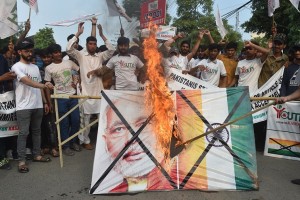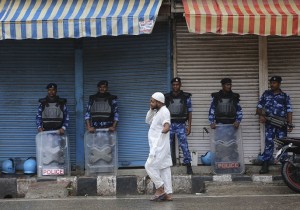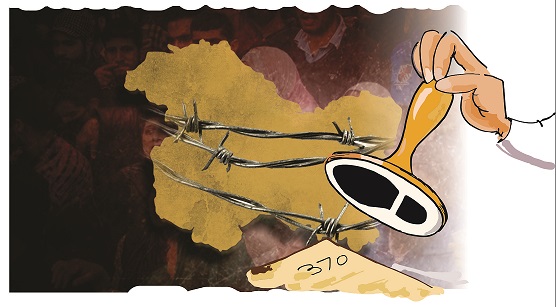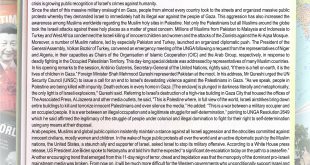The Kashmir Saga
Identifying the Responsible Actors and the Way Forward
Mairaj ul Hamid Nasri
Gone are the days when states were bound to the rules laid down by the United Nations and other international institutions. Kashmir is in darkness and has been converted into the largest human prison in the world since Aug 05 by the oppressive Indian government. Blatant violations of human rights are at their peak, and continual curfew is killing the people of Kashmir owing to hunger and fear. Kashmir was one of the most important issues in Asia until the recent past and it has, of late, caught attention of the international community. But, sadly, at this critical point in history, no one talks seriously about the state of affairs in the occupied valley. Both the confronting states, i.e. India and Pakistan, have discussed the issue on various international forums and obligations derived from them have kept both the states away from direct confrontation a number of times. But the recent unilateral action of changing the status of Kashmir by Narendra Modi’s BJP government has once again brought the two states at the brink of war.
The passing of Jammu and Kashmir Reorganization Act, 2019, by the Indian parliament has changed the dynamics of regional politics, and the regional peace is once again at stake. The decision has also raised questions regarding the role, and the preparation, of Pakistani government.
 Although the decision is a clear-cut violation of United Nations Security Council Resolution 47 and Simla Agreement of 1972, who dares to stop India from doing so? This issue was internationalized by India itself when it approached the United Nations on 21st April 1948 for a ceasefire with Pakistan and it agreed to decide the fortune of Kashmir through a plebiscite. It was in accordance with Article 35 of the Charter of the United Nations which suggests that if there arises an issue which may lead to a war and probably create a threat for the regional peace, the United Nations may be approached for mediation and creating a way out for resolving the issue. Here, both the states – Pakistan and India – are bound to follow the UN resolutions. Pakistan has complied so far, but India has always defied these resolutions.
Although the decision is a clear-cut violation of United Nations Security Council Resolution 47 and Simla Agreement of 1972, who dares to stop India from doing so? This issue was internationalized by India itself when it approached the United Nations on 21st April 1948 for a ceasefire with Pakistan and it agreed to decide the fortune of Kashmir through a plebiscite. It was in accordance with Article 35 of the Charter of the United Nations which suggests that if there arises an issue which may lead to a war and probably create a threat for the regional peace, the United Nations may be approached for mediation and creating a way out for resolving the issue. Here, both the states – Pakistan and India – are bound to follow the UN resolutions. Pakistan has complied so far, but India has always defied these resolutions.
The decision to annex Kashmir has been made and the Indian parliament has passed the Bill to that effect; however, some sane minds, keeping in view the independence of judiciary in India, still hope that the Indian Supreme Court will turn down this piece of legislation, and the previous status of Kashmir will be restored. But, considering the ground realities and the supremacist Hindutva ideology of Modi and his patron RSS, the possibilities suggest otherwise. The judges, owing to the possible repercussions from RSS and Hindutva followers, may not dare to declare this Act null and void. Due to the elements of majoritarianism and populism in incumbent Indian government, the secular status of the Indian constitution will also become vulnerable as the prevailing Hindutva ideology may become a legitimate state ideology through the constitutional change. However, due to the heterogeneity of Indian society, such a situation may lead to an unending civil war.
Coming towards the response of the Pakistani government and its institutions, one may find that as far as issuing statements and condemnations is concerned the incumbent government has done well. But on the preparatory level, our government and institutions seem to have terribly failed. The BJP in its manifesto had vowed the annexation of Jammu and Kashmir and revocation of Article 370 of the Indian constitution, but our government didn’t pay any attention to this looming danger. It was, on the contrary, predicted that Modi would take some serious actions about improving his relationships with Pakistan, and the Muslims of India. It was the primary responsibility of our institutions and security agencies to foresee, and prepare a response for, this possible action. Worryingly, we are far behind India as far as diplomacy is concerned as our approach to international community has not been that effective and influential as that of India. It was clear from the attitude of incumbent as well as the previous governments that Kashmir is no more on our priority list, and we should get rid of this unhealable burden. Some people smell a rat in the first-ever trip of Prime Minister Imran Khan to USA regarding Kashmir issue. On return, Mr Khan heralded that he feels as if he has won the world cup. But critics say that there is no such visible achievement in his visit which can be compared with winning a world cup, however, there may be a secret deal which has made Mr Khan so much excited.
Moreover, the response of the prime minister in joint session of the parliament about the possible action of Pakistani government was hilarious, where he surprisingly asked the opposition leader: “Tell me what I should do? Should I attack India?” It shows the unpreparedness and reluctance on the part of the government for considering Kashmir. His statement in the Legislative Assembly of AJK about responding the brick with a stone to India seems to be just a political gimmick as he is waiting for India’s attack on AJK in spite of retaliating over the already annexed part of Kashmir. The government should have prepared itself for a strong reaction over the Indian aggression rather than a possible Indian attack on AJK. The bigwigs of the government are issuing discouraging statements wherein they portray India as a giant and an undefeatable enemy. As representatives of a nuclear-armed nation, these statements do not suit the high-ups of the Islamic Republic of Pakistan against its enemy number one.
 The way forward for Pakistan is in drawing up a comprehensive strategy for fighting Kashmir issue on all available international forums, and strengthening our capabilities of war on tactical, conventional and unconventional levels, internally. Pakistan should to every extent for extending moral, physical, economic, diplomatic, political and military support to the Kashmiris. The international community should be made to realize that it is the prime duty of the UN and the United States to compel the Indian government to restore the previous status of Kashmir. It should be done as soon as possible because due to the amendment in Article 35A of the Indian constitution, Indian Hindus will now be given incentives for moving into Kashmir and change the demography of the occupied valley on Tibetan and Israeli style, so that in case of plebiscite, Hindus should be in majority there.
The way forward for Pakistan is in drawing up a comprehensive strategy for fighting Kashmir issue on all available international forums, and strengthening our capabilities of war on tactical, conventional and unconventional levels, internally. Pakistan should to every extent for extending moral, physical, economic, diplomatic, political and military support to the Kashmiris. The international community should be made to realize that it is the prime duty of the UN and the United States to compel the Indian government to restore the previous status of Kashmir. It should be done as soon as possible because due to the amendment in Article 35A of the Indian constitution, Indian Hindus will now be given incentives for moving into Kashmir and change the demography of the occupied valley on Tibetan and Israeli style, so that in case of plebiscite, Hindus should be in majority there.
Furthermore, despite waiting for an Indian attack on AJK, Pakistan should create troubles for India on the border and any other possible venue so that India appeals to the international community for mediation. Muslim states should also be mobilized for showing support for the Kashmiris on every forum. It is the time where Pakistani government has to decide on the future of Pakistan as losing Kashmir is losing the country’s jugular vein. Loosing Kashmir is not only losing Kashmiri people and their land, it is also an unbearable loss of five rivers coming from Kashmir, the strategically important Laddakh, Jammu and adjacent areas. Pakistan should join hands with China as the annexation of Kashmir by India challenges the border areas of India and China as well.
Last but not least, Pakistan should opt for lawfare in international forums and should file appeals in the International Court of Justice, UN Security Council and UN General Assembly so as to bring India under the obligations of international law. According the principles of International Customary Law and Estrada Doctrine 1931, states do not recognize those areas which are annexed through force and other unlawful means. Thus, Pakistan should compel states to stop them from recognition of Kashmir as an integral part of India.
The author teaches Political Science at University of Malakand, Chakdara. He can be reached at mairajulhamid717@gmail.com
 Jahangir's World Times First Comprehensive Magazine for students/teachers of competitive exams and general readers as well.
Jahangir's World Times First Comprehensive Magazine for students/teachers of competitive exams and general readers as well.



